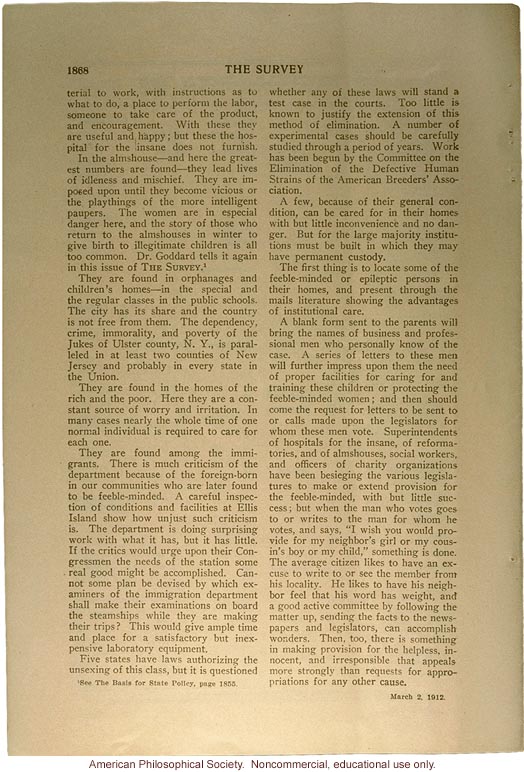1868 The Survey
terial to work, with instructions as to what to do, a place to perform the labor, someone to take care of the product, and encouragement. With these they are useful and happy; but these the hospital for the insane does not furnish.
In the almshouse - and here the greatest numbers are found - they lead lives of idleness and mischief. They are imposed upon until they become vicious or the playthings of the more intelligent paupers. The women are in especial danger here, and the story of those who return to the almshouse in winter to give birth to illegitimate children is all too common. Dr.Goddard tells it again in this issue of the Survey.[sup]1[end superior]
They are founding orphanages and children's homes - in the special and the regular classes in the public schools. The city has its share and the country is not free of them. The dependency, crime, immorality, and poverty of the Jukes of Ulster county, N. Y. is paralleled in at least two counties of New Jersey and probably in every state of the Union.
They are found in the homes of the rich and the poor. Here they are a constant source of worry and irritation. In many cases nearly the whole time of one individual is required to care for each one.
They are found among the immigrants. There is much criticism of the department because of the foreign-born in our communities who are later found to be feeble-minded. A careful inspection of conditions and facilities at Ellis Island show how unjust such criticism is. The department is doing surprising work with what it has, but it has little. If the critics would urge upon their Congressmen the needs of the station some real good might be accomplished. Cannot some plan be devised by which examiners of the immigration department shall make their examinations on board the steamships while they are making their trips? That would give ample time and place for a satisfactory but inexpensive laboratory equipment.
Five states have laws authorizing the unsexing of this class, but it is questioned whether any of these laws will stand a test case in the courts. Too little is known to justify the extension of this method of elimination. A number of experimental cases should be carefully studied through a period of years. Work has been begun by the Committee on the Elimination of the Defective Human Strains of the American Breeders' Association.
A few, because of their general condition, can be cared for in their homes with but little inconvenience and no danger. But for the large majority institutions must be built in which they may have permanent custody.
The first thing is to locate some of the feeble-minded or epileptic persons in their homes, and present through the mails literature showing the advantages of institutional care.
A blank form sent to the parents will bring the names of business and professional men who personally know of the case. A series of letters to these men will further impress upon them the need of proper facilities for caring for and training these children or protecting the feeble-minded women; and then should come the request for letters to be sent to or calls made upon the legislators for whom these men vote. Superintendents of hospitals for the insane, or reformatories, and of almshouses, social workers, and officers of charity organizations have been besieging the various legislatures to make or extend provision for the feeble-minded, with but little success; but when a man who votes goes to or writes the man for whom he votes, and says, "I wish you would provide for my neighbor's girl or my cousin's boy or my child," something is done. The average citizen likes to have an excuse to write to or see a member from his locality. He likes to have his neighbor feel that his word has weight, and a good active committee by following the matter up, sending the facts to the newspapers and legislators, can accomplish wonders. Then, too, there is something in making provision for the helpless, innocent, and irresponsible that appeals more strongly than requests for appropriations for any other cause.
March 2, 1912.
[sup]1[end superior] See the Basis for State Policy, page 1855.


